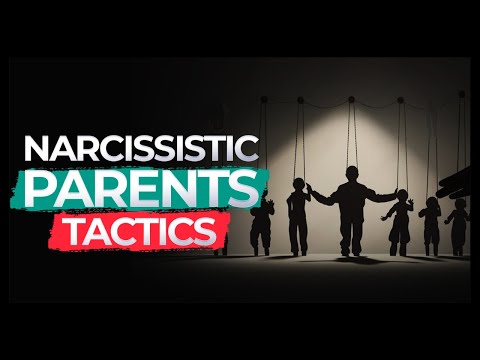I want to talk about toxic tactics used by narcissistic parents that cause childhood trauma. These are very important, I believe. Very much so. That awareness is a road to recovery, and a lot of people are beginning to become aware of how their family affected them, whether they had narcissistic parents or not. Just becoming aware of how you fit into your family and how your family operates gives you a considerable amount of information about yourself, how you function, and ways that you can change.
1. Emotional Neglect:
The first one is emotional neglect. I don’t think that’s a new one to a lot of people, probably. And why do narcissists neglect emotionally? Because there’s no focus on someone else. There’s only a focus on themselves, and parents will focus on themselves, neglecting their children. Then, guess what? That teaches us to neglect ourselves. We then internalize that and end up neglecting ourselves. Do you want to heal? Stop neglecting yourself, and that will begin to break the cycle between your parents and what they did and help you to become more of a true and real self.
2. Gaslighting:
A denial of events and history and a denial of reality. I think this is always a very tricky one for kids growing up in narcissistic homes because then they don’t know what is real and what is not real. And they don’t feel they can trust their own view. They lose their trust in their sense of reality and they will often compromise so many things because they don’t have a solid sense of their own reality when they have been gaslighted.
When others have denied events and history and just denied the way things actually were. You know, just like, you know, so many times I’ve heard someone say, ‘Well, I confronted my father about his physical abuse when Mom and Dad were going through a divorce. Dad then says that never happened. There was no physical abuse. What are you talking about? You are just a kid.
I’m the adult. I know what happened.’ Then when we get to work our boss says, ‘That didn’t happen, and you’re just an employee. I’m the boss.’ We’ll fall into that same family pattern rather than a true self-differentiated pattern of, ‘Well, you may believe that, but that is not what I believe.’ And that’s a little harder for us, uh, who have been adult children of narcissists to own, that you can believe something wrong. I can believe something that’s right, and I’m not changing that.
Related:
Malignant narcissist vs narcissist how to spot the difference
11 Common Ways a covert narcissist punishes you
10 Must know signs you’re dealing with narcissistic abuse
10 Frequently missed covert narcissist signs
5 Things not to say to someone with depression top
7 Strange behaviors of covert narcissists
3. Another tactic would be Stonewalling and Silent Treatment:
Stonewalling and silent treatment. We as kids don’t understand what that means. ‘Why am I being unloved now? Why have I made Mom or Dad so unhappy?’ And kids will, as we all have been taught, or many of us have, kids will take responsibility for their parents’ unhappiness many times.
They will take responsibility for their happiness and their unhappiness. And if there’s stonewalling and silent treatment going on, then there must be something that I’ve done wrong and I need to figure it out. Not the other person is a psychopath or totally emotionally neurotic or messed up with their personality disorder and cannot function in a healthy, mature relationship.
4. Covert Put Downs:
Covert putdowns are very insidious because they’re covert. There certainly can be overt putdowns: ‘You’re stupid, you’re ugly, nobody would ever want to marry you, no one will ever take you as a husband.’ All those are overt examples. Covert putdowns might be a little more subtle like this, but very traumatic because they just go in like a corkscrew in our hearts. They just don’t feel right. For example, ‘You know, for being so large, you have such a pretty face, Mary.’ ‘We just loved you when you were so clumsy.
You know, those are covert put-downs. They’re told to you in a complimentary way with a put-down twist. And we may miss those as we get older. We may not recognize that someone is doing that to us. And even over the years, I’ve worked on trying to get better at identifying these things when others will pay me a compliment. Or is it truly a compliment? Or are they coding something mean or negative in complimentary words or a fashion? And that’s, I’ve had kind of a blind spot to that earlier on in my life. And I think that came from covert put-downs.
5. Verbal Abuse:
We may get verbally abused, that’s more of the overt put-downs. But verbal abuse can be even meaner and more difficult than just overt put-downs. Verbal abuse can be scathing, and very negative. It can have lots of cussing, swear words, and a lot of shaming components to it. And when we get this verbal abuse, again, it kind of attacks the cells inside our body.
And we may tend to internalize that as kids. That you know, maybe there’s something about me that makes this right. Because we kids have not developed into mature adults, nor do we have the ego defenses yet to be able to block out crazy people or crazy parents.
We don’t have that yet. So it kind of gets in the cells and we start going, ‘You know, I wonder, even though it’s harsh, I wonder if some of that’s true. Or it feels bad, but you know, maybe that’s really who I am.’ And it causes us a lot of questions. And so we can work on becoming more confident again.
If we have internal boundaries, which is the ‘I don’t care, I’m detached, you’re not going to get me reactive, it doesn’t matter to me’ kind of messages, are internal boundaries. And they become more common as we practice those things. So that when we come up against a narcissist, we just look at them like a rare kind of strange animal that’s making these noises. You know, we’re going, ‘What is wrong with them? What is this? This is so crazy.’ Whatever they’re talking about. And then I don’t absorb it, which I did when I was growing up as a kid. You can learn how to do that. You truly can.
6. Malignant projections:
They project their negative traits onto you. ‘You’re so mean and you’re so sensitive.’ Typically, the narcissistic parent is mean and overly sensitive. And so they project those onto you, which then as a child, you’re going, ‘Oh, okay, they may be right. Maybe that is what I’m doing. Maybe that’s why I feel so bad.’ Because I am mean or because I’m too sensitive. No, they are just skewing the picture. But we will take it inside and we can begin to heal from that as well.
7. Sabotage and Pathological Envy:
Narcissistic parents cannot share the limelight. They cannot share the stage with anyone else, and even their children, unless their children are doing something that makes them look better or good. But if it doesn’t make them look better or good, then they’re going to have pathological envy. And then they may start to sabotage because they can’t stand that. And that will be traumatic for the child because they don’t understand why is Mom or Dad competing with me.
What if I’m just being me? Why are they putting down my successes when they don’t have to? It’s not even something they’re doing. It’s something I’m doing because they can’t handle the ego attack. They can’t handle their ego being challenged in that way.
8. Hot and Cold Behavior:
Love bombing and punishment. Love bombing and punishment, hot and cold. ‘I love you, you’re wonderful.’ And then, ‘Why do you always do everything wrong? Why, you know, I love you, this is why I have to treat you so badly.’ These mixed messages are really problematic for us growing up with the hot and cold behavior. And that’s where we’ll get into relationships and find those who love bombs and then punish them.
9. Rage Attacks:
Rage attacks, certainly, are frightening, are upsetting. We can feel fear about those. We want to avoid them. Again, we can have a love bombing going on and then they get into a rage attack about something else that might come up even on the same day. And we must look at reducing our enjoyment of the love bombing and reducing our tolerance of the rage attacks. Rage attacks are sick. They mean they are toxic and are not deserving of understanding because you are being attacked. That’s not someone sharing with you some anger that they have, that’s attacking you and acting out their brokenness. That’s what rage attacks are.
10. Micromanaging:
They need to be involved in every decision and guide every decision. You know, ‘What are you wearing? What are you doing? Who are you going with? Who are you dating? What do you look like? How are your grades? Are you studying enough? Are you going to be successful?’ Because all of this is about them.
It’s not about us. And so what happens is we fall into that being micromanaged pattern. And then as adults, we have a hard time knowing how to manage ourselves because we’ve been micromanaged for so long. It’s like, ‘I don’t know what I want to do. I don’t know where I want to go.’ You know, ‘My parent passed away, or I don’t live near my parent and now what do I do?’ Because I don’t have their guidance because we’ve never had a self.
And again, I have that training ‘Build the Real Self You Were Never Allowed to Have’ because you do have that guidance. You just haven’t explored it for yourself. Micromanaging is not what you’re looking for either, either in a relationship or either from parents. And in fact, parenting ends at age 18.
I’m not saying every family is the same, but I am saying that dynamic should end. Doesn’t mean we can’t help our kids when they go beyond 18, certainly, we can, but we need to be really careful about parenting them after 18. You can help, you can support, you can be an advice, you know, if they ask, you can be a pool of information for them if they need that. But parenting should stop for their benefit.
11. Neglect and physical deprivation.
That gets more serious when we are neglected. Now, early on, we talked about emotional neglect. Physical neglect, I have many clients who said parents never took me to the dentist, parents never took me to the doctor, parents never, you know, they never cared about my diet, they never cared about what I was eating. And again, if there was micromanaging involved, they might be overly concerned about those things or they might swing the other way and then not even care about what’s going on.
‘Yeah, I was laying there with bronchitis, you know, dying of coughing or whatever and they said, ‘Oh, here, take some chicken soup and we don’t worry about it, we don’t have time to take you to the doctor.’ Well, that’s neglect and physical deprivation is what that is. Or maybe they go out and have a nice meal and they don’t cook anything for their kids because it’s just not that important because what’s important is them.
And then what happens when we become adults, we’re not so good at taking care of ourselves. We were not modeled that, so you can learn to do that. You can learn through reading, coaching, workshops, through lots of learning topics, and you can learn to take care of yourself.
12. Triangulation:
Triangulation is, you know, Mom and Dad and you, Mom and brother and you, you know, that’s a triangulation kind of relationship. And many times, narcissistic families operate on triangles because there aren’t healthy boundaries. Everybody’s got to be mixed up in everybody else’s stuff all the time. And it’s not in a loving way, usually. It has to do with power, jealousy, anger, you know, those kinds of things. And we get pulled in so much by these immature adults who are NPD, narcissistic personality disorder parents.
We get pulled into that, and we are triangulated into their issues. Certainly, adult children of Alcoholics are triangulated as well. You have the alcohol and the parent and the child, that’s a triangulation because it doesn’t take three people always. It can take an issue and two people. But many times in families where there’s narcissism, you do have three people involved. And it could be Grandma, Aunt Susie, and you.
You could be Aunt Susie and you and Mom. And there’s always conflict going on there. Nobody can just be themselves without an enmeshment somewhere. No one can just be who they are, they must be glued onto, clinging to someone else emotionally. They would deny it of course, but that’s how it functions. And we can learn to break those triangles, and I think that’s very important.
13. Pitchforking and Cabaling:
That’s the secret or open click or factions that we find in narcissistic homes. If you’ve got the scapegoat, then you may have pitchforking and cabaling. That we’re all going to go after them. You know, I’ve had clients in the past whose families did come after them, just like in Shrek, you have all the townspeople coming with a pitchfork to go after the ogre. They had become the ogre, and everybody was coming with a pitchfork and they said, ‘We just like to all get together and talk together and we like to have you, Bob (not real name), and your wife come and join us.
Related:
Malignant narcissist vs narcissist how to spot the difference
11 Common Ways a covert narcissist punishes you
10 Must know signs you’re dealing with narcissistic abuse
10 Frequently missed covert narcissist signs
5 Things not to say to someone with depression top
7 Strange behaviors of covert narcissists
No, that’s going to be a pitchforking, that’s a big cabal of the family and it’s you versus the cabal. Don’t do it. That’s where it’s better to divide and conquer rather than try to go up against pitchforking, group scapegoating, and smear campaigns. That’s basically in terms of what happens as a result of pitchforking, you become a scapegoat, and there are smear campaigns about you. So your image and how you believe you are seen by other people is tarnished by the lies, the scapegoating.
And of course, as you all know, I forget the old saying but you know, a lie can go all the way around the world in 24 hours, the truth takes forever to go around the world. A lie just goes so much quicker in relationships and in relationship systems. So lies are very damaging, but that’s where we have to learn to maintain a sense of self, a sense of calmness, a sense of self-esteem, and self-confidence. Those all can be learned. Those all can be worked on to where the scapegoating becomes less of a problem, and less traumatic. And we also can even learn to avoid.
Scapegoating and smear campaigns because I think you can do some pre-work to help that not to happen. I found people who have grown up in dysfunctional families to get scapegoated at work. Well, they needed more information about what to do to avoid the scapegoating. So there are some things that we can learn about scapegoating and to avoid it as well and to heal from it.
14. Covert Emotional Incest and Parentification:
Covert emotional incest and parentification, emotional incest can be the triangles. It’s where someone is just on top of us emotionally. It’s like two circles that are overlapped, you know, ‘I’m you and you are me.’ We used to sing the song, there’s a famous song, ‘Well, I gotta be you, I gotta be you,’ and we would jokingly sing that, ‘You gotta be me, you gotta be me.’ And we would make fun of how we feel so pressured to have to be like someone else. And there’s a lot of pressure in dysfunctional families for emotional incest to happen.
Again, I think it’s emotional incest if the daughter is talking to Mom about her se*xual problems with her husband or the husband is talking to his Dad about se*xual problems with his wife. It’s incestuous. There are plenty of ways to get help for those things. We don’t need to talk inter-generationally about those issues. Now, I’m not saying we can never get some counselor advice.
I, there are good parents out there, there are. But you know, when you’re talking about narcissistic parents, that’s much more of, ‘I want more information about you, have you ever been with someone, a friend or even a family member where everything they talk about and everything they do is to squeeze information out of you?’ That’s emotional incest.
If they’re squeezing it, just every question they have, now it seems innocent, you know, ‘Oh well, how are you doing at work? You know, how’s your pay? Is your pay pretty well for what you’re doing at work? I know it’s a new job.’ They’re asking all these questions so they can go back and tell other people or they feel more satisfied that they have more knowledge which is currency now in dysfunctional families, the more knowledge I have, the more I can spend emotionally in the family. And I’ve had that situation where people have asked me questions, every time they ask, I’d go, ‘What are, are, are they writing a book? What’s going on?’ That’s emotional incest.
15. Se*xual abuse and coercion
Lastly, se*xual abuse and coercion. That also happens in narcissistic homes. I’ve been working with some clients that clearly there was se*xual abuse by Mom and in another situation, se*xual abuse by Dad and it was all just kind of swept under the carpet and you know, Mom loved you and Dad loved you but there was a felt sense of coercion about it because the parents were so broken they did not have the empathy at that time to understand how painful and difficult it would be if they followed through on their desires and of course, they came from some generations of Brokenness probably as well and so those are common kind of traumatic situations.
Related:
Malignant narcissist vs narcissist how to spot the difference
11 Common Ways a covert narcissist punishes you
10 Must know signs you’re dealing with narcissistic abuse
10 Frequently missed covert narcissist signs







Leave a Comment